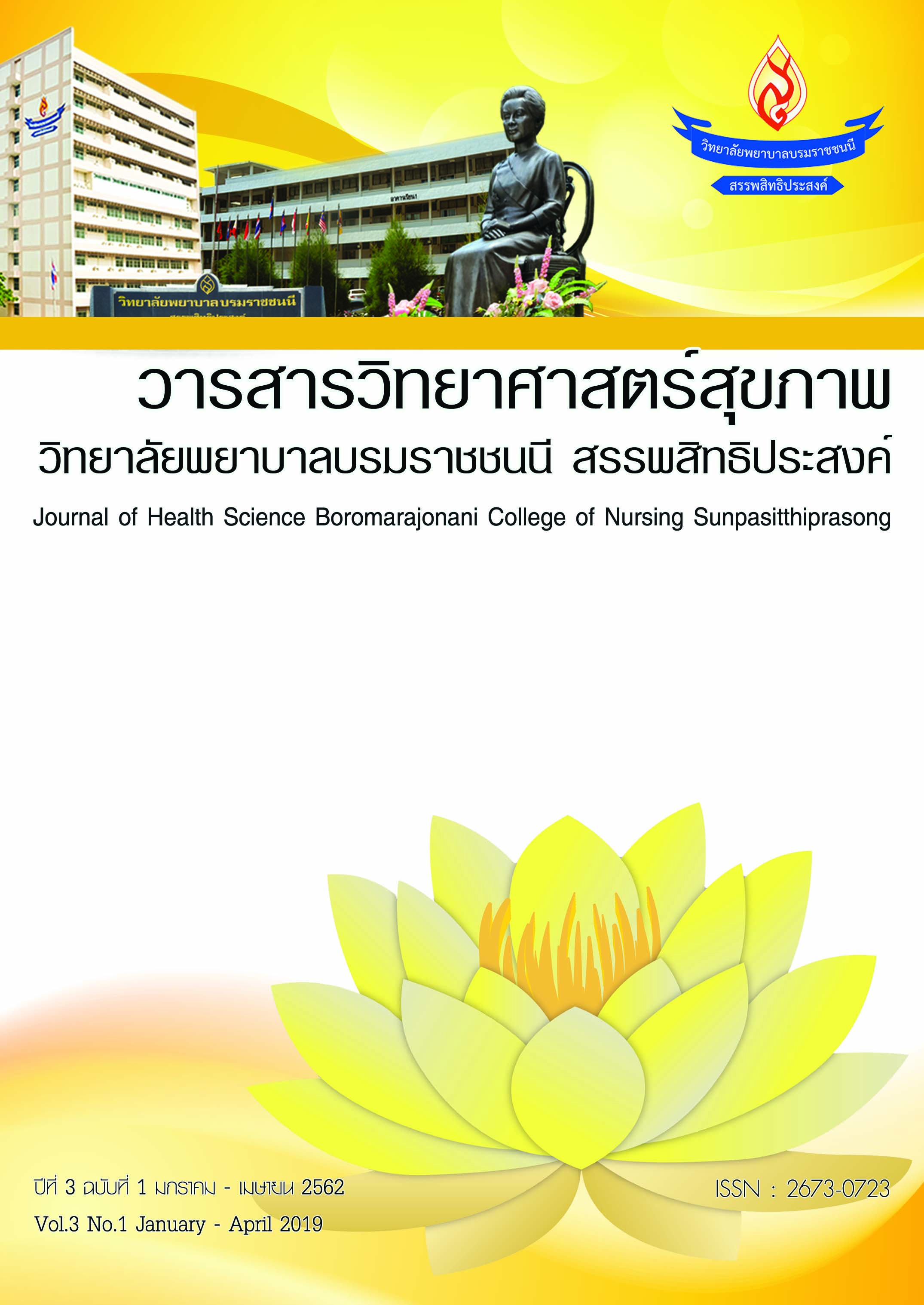บทบาทของพยาบาลชุมชนเพื่อการส่งเสริมพลังสุขภาพจิต ในผู้สูงอายุไทย
คำสำคัญ:
พลังสุขภาพจิต, ผู้สูงอายุไทย, บทบาทพยาบาลชุมชนบทคัดย่อ
ผู้สูงอายุไทยกำลังเผชิญกับความเสื่อมถอยของร่างกาย โรคเรื้อรัง รายได้ที่ไม่เพียงพอ การเปลี่ยนแปลงบทบาททางสังคม จากการสำรวจพบว่าผู้สูงอายุไทย มีระดับพลังสุขภาพจิตปานกลาง ซึ่งหากไม่สามารถปรับตัวต่อสถานการณ์เหล่านี้ได้ ก็จะทำให้เกิดภาวะซึมเศร้าตามมา พลังสุขภาพจิตเป็นชุดของความสามารถในการปรับตัวต่อสถานการณ์ความยากลำบาก จึงเป็นเครื่องมือสำคัญที่จะช่วยให้ผู้สูงอายุสามารถดำเนินชีวิตต่อไปได้ พยาบาลชุมชนถือเป็นบุคคลสำคัญที่มีความใกล้ชิดกับชุมชนและผู้สูงอายุ บทความวิชาการนี้มีวัตถุประสงค์เพื่อสนับสนุนความรู้ความเข้าใจและแนวทางในการส่งเสริมพลังสุขภาพจิตแก่ผู้สูงอายุในชุมชน ทั้งนี้การส่งเสริมพลังสุขภาพจิตในผู้สูงอายุนั้นจะต้องคำนึงถึงความเพียงพอของรายได้ การสนับสนุนทางสังคม และการรับรู้ภาวะสุขภาพของผู้สูงอายุ รวมถึงพยาบาลชุมชนควรได้รับการพัฒนาคุณลักษณะเฉพาะ ได้แก่ การมีทัศนคติที่ดีต่อผู้สูงอายุ มีบุคคลิกภาพที่เหมาะสมกับวัฒนธรรมของแต่ละพื้นที่ ใจเย็น อดทน และใส่ใจ ในการทำงานอย่างจริงจัง
References
สำนักงานกองทุนสนับสนุนการสร้างเสริมสุขภาพ(สสส.). ปี 68 ไทยก้าวสู่สังคมผู้สูงอายุอย่างสมบูรณ์ [อินเตอร์เน็ต]. 2557 [เข้าถึงเมื่อ 1 พ.ค. 2561]. เข้าถึงได้จาก: https://www.thaihealth.or.th/Content/23525-ปี%2068%20ไทยก้าวสู่สังคมผู้สูงอายุอย่างสมบูรณ์%20.html
ศศิวิมล วรุณศิริ. อาเซียนกับสังคมผู้สูงอายุ: กรมประชาสัมพันธ์ [อินเตอร์เน็ต] 2558. [เข้าถึงเมื่อ 1 พ.ค. 2561]. เข้าถึงได้จาก: http://www.aseanthai.net/ewt_news.php?nid=5102&filename=index
Knodel J, Kespichayawattana J, Saengtienchai C, Wiwatwanich S. How left behind are rural parents of migrant children? Evidence from Thailand. Ageing & Society 2010;30:811-41.
Knodel J, Saengtienchai C. Rural parents with urban children: Social and economic implications of migration for the rural elderly in Thailand. Population, Space and Place 2007;13:193-210.
Knodel J. The future of family suppoty for Thai elderly: Views of the populace. Population Studies Center University of Michigan: Institute for Social Research; 2012.
Knodel J, Chayovan N. Population ageing and the well-being of older persons in thailand: Past trends, current situation and future challenges. Bangkok: UNFPA Thailand and Asia and the Pacific Regional Office; 2008.
Apideckul T. Comparison of quality of life and mental health among elderly people in rural and suburban areas, Thailand. Southeast Asian Journal of Tropical Medicine and Public Health 2011;42:1282-92.
Suttajit S, Punpuing S, Jirapramukpitak T, Tangchonlatip K, Darawuttimaprakorn N, Stewart R, et al. Impairment, disability, social support and depression among older parents in rural Thailand. Psychological Medicine 2010;40:1711-21.
มนตรี ประเสริฐรุ่งเรือง, ดุษฎี อายุวัฒน์. การสร้างทางเลือกในการพึ่งพาตนเองอย่างมีคุณค่าของผู้สูงอายุรุ่นใหม่. วารสารประชากร 2559;4:23-45.
Werner EE. Risk, resilience, and recovery: Perspectives from the Kauai longitudinal study. Development and Psychopathology 1993;5:503-15.
Dyer JG, McGuinness TM. Resilience: Analysis of the concept. Archives of Psychiatric Nursing 1996;10:276-82.
Jacelon CS. The trait and process of resilience. Journal of Advanced Nursing 1997;25:123-9.
Windle G. What is resilience? A review and concept analysis. Reviews in Clinical Gerontology 2011;21:152-69.
Earvolino-Ramirez M. Resilience: A concept analysis. Nursing Forum 2007;42:73-82.
Wagnild G, Collins J. Assessing resilience. Journal of Psychosocial Nursing & Mental Health Services 2009;47:28-33.
Lavretsky H, Irwin MR. Resilience and aging. Aging Health 2007;3:309-23.
Rosowsky E. Challenge and resilience in old age. Generations 2009;33:100-2.
Hicks MM, Conner NE. Resilient ageing: A concept analysis. Journal of advanced nursing 2013:744-55.
Kessel GV. The ability of older people to overcome adversity: A review of the resilience concept. Geriatric Nursing 2013;34:122-7.
World Health Organisation. World report on ageing and health: World Health Organisation [Internet]. 2015 [cited 2016 Jan 11]. Available from: http://www.who.int/ageing/events/world-report-2015-launch/en/
Phadungyam M, Duvall AC. Rehabilitation strategies for resilience quotient in the elderly. Journal of the royal Thai army nurses 2018;19:66-73.
Parayat C, Kangchai W, Somanusorn S. Predicitve factors of resilience among elderly Journal of faculty of nursing Burapha University 2016;24:97-106.
เพ็ญนภา กุลนภาดล, จุฑามาศ แหนจอน. การศึกษาและพัฒนาภูมิคุ้มกันทางใจวัยสูงอายุ โดยการบูรณาการกระบวนการมีส่วนร่วมของครอบครัวและเครือข่ายประชาสังคม. สถาบันวิจัยระบบสาธารณสุข: มหาวิทยาลัยบูรพา; 2558.
ฐานันท์ดา มุสิกสิริจิรกุล, บัวทอง สว่างโสภากุล. ความยืดหยุ่น สัมพันธภาพในครอบครัว การเข้าร่วมกิจกรรมทางสังคม และความพึงพอใจในชีวิตของผู้สูงอายุ ตำบลบางรักพัฒนา อำเภอบางบัวทอง จังหวัดนนทบุรี. วารสารมนุษยศาสตร์และสังคมศาสตร์ มหาวิทยาลัยมหาสารคาม 2559;35:75-86.
อรุณลักษณ์ คงไพศาลโสภณ. ปัจจัยคัดสรรที่มีความสัมพันธ์กับความเข้มแข็งทางใจของผู้ป่วยโรคซึมเศร้าสูงอายุ. คณะพยาบาลศาสตร์: จุฬาลงกรณ์มหาวิทยาลัย; 2559.
Pathike W, O'Brien AP, Hunter S. An ethnographic study to understand the concept of rural Thai elderly resilience: rural elderyl and comminity nurses' perspectives. University of Newcastle Research Higher Degree Thesis: University of Newcastle; 2016.
Pathike W, O'Brien AP, Hunter S. Moving on from adversity: an understanding of resilience in rural Thai older people. Aging and Mental Health 2017;11:1-8.
Pathike W, O'Brien AP, Hunter S. World. Elderly resilience in Thailand: An Ethnographic study. Australian Nursing & Midwifery Journal 2015;22:21.
Downloads
เผยแพร่แล้ว
How to Cite
ฉบับ
บท
License
บทความที่ได้รับการตีพิมพ์เป็นลิขสิทธิ์ของวารสารวิทยาศาสตร์สุขภาพ วิทยาลัยพยาบาลบรมราชชนนี สรรพสิทธิประสงค์ ข้อความที่ปรากฏในบทความแต่ละเรื่องเป็นความคิดเห็นส่วนตัวของผู้เขียนแต่ละท่านไม่เกี่ยวข้องกับวิทยาลัยพยาบาลบรมราชชนนี สรรพสิทธิประสงค์ และคณาจารย์ท่านอื่นๆ ในวิทยาลัยพยาบาลฯ ความรับผิดชอบเกี่ยวกับบทความแต่ละเรื่องผู้เขียนจะรับผิดชอบของตนเอง



